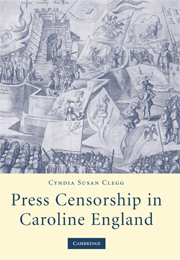Book contents
- Frontmatter
- Contents
- Acknowledgments
- Chapter 1 Censorship and the law: the Caroline inheritance
- Chapter 2 Print in the time of Parliament: 1625–1629
- Chapter 3 Transformational literalism: the reactionary redefinition of the courts of High Commission and Star Chamber
- Chapter 4 Censorship and the Puritan press
- Chapter 5 The printers and press control in the 1630s
- Chapter 6 The end of censorship
- Notes
- Bibliography
- Index
Chapter 1 - Censorship and the law: the Caroline inheritance
Published online by Cambridge University Press: 22 September 2009
- Frontmatter
- Contents
- Acknowledgments
- Chapter 1 Censorship and the law: the Caroline inheritance
- Chapter 2 Print in the time of Parliament: 1625–1629
- Chapter 3 Transformational literalism: the reactionary redefinition of the courts of High Commission and Star Chamber
- Chapter 4 Censorship and the Puritan press
- Chapter 5 The printers and press control in the 1630s
- Chapter 6 The end of censorship
- Notes
- Bibliography
- Index
Summary
William Prynne, who was tried in the court of Star Chamber in 1634 for several charges (including sedition and perjury) in relation to the duly authorized book he had written denouncing actors and the theatre (Histrio-mastix, 1633), looms so large in the historical imagination of Caroline England, that however often his story has been told, any effort to come to terms with the relationship between the government of Charles I and print culture must contend with Prynne and his place in the historical imagination. I begin here with Prynne's name not to ground my study of Caroline press censorship in the encounter between Prynne and the Caroline regime, but to suggest the complex investments that have attended even the most astute studies of England between Charles I's accession in 1625 and his execution in 1649. However cautiously scholars have sought to navigate the troubled waters of seventeenth-century historiography, the events of the 1640s and 1650s – whether “Civil War,” “Rebellion,” or “Revolution” – inevitably impinge upon the ways in which stories like Prynne's have been told. It may appear to be an artificial exercise to attempt to place press censorship during the reign of Charles within its prevailing economic, political, and religious contexts, looking back to historical precedents rather than forward to the Civil War, as this study seeks to do. Considering a few of the narratives that have attached to Prynne's trial, however, should suggest the desirability (indeed the necessity) of such an approach.
- Type
- Chapter
- Information
- Press Censorship in Caroline England , pp. 1 - 43Publisher: Cambridge University PressPrint publication year: 2008



